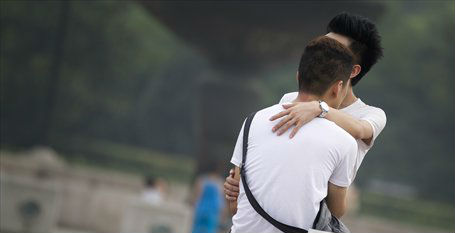“If I cannot accept it and support him, he will never be truly happy. I don’t want my child to live in pain,” said Mei Jie, a Shandong native who is running free counseling sessions for Shanghai families with gay children.
Similarly, Wu Youjian who made headlines throughout China’s media for coming out very publicly as the mother of a gay son, founded PFLAG (Parents, Friends and Families of Lesbians and Gays) China.
Last month, the group welcomed hundreds of parents and their gay children in downtown Shanghai for a conference where they shared and exchanged experiences and feelings.
“It is certainly no easy thing to turn around most Chinese parents’ deep-rooted prejudices and misunderstandings of homosexuality,” says globaltimes.cn.
Although same-sex relations was in the early 2000s removed from China’s list of mental illnesses, the deeply held Chinese belief that children are required to marry and bear offspring to continue the family line makes it still heavily stigmatized.
Nonetheless, some parents who have been at the forefront of change say that their present goal is to attain marriage equality for gay men and women in China.
“I’ve been working on drafting proposals advocating legislation to the country’s policymakers for gay marriage,” said Xiao Tao’s father. Xiao Tao’s family has already recognized the de facto marriage of their son and his partner.
Since 2001 when the Netherlands became the first country to recognize gay marriage Li Yinhe, a research fellow with the Chinese Academy of Social Sciences, first put forward a proposal on gay marriage to the annual meetings of the country’s policymakers in 2003.
But the issue only gained attraction five years later when Li restated her proposal.
Last year, an open letter signed by more than 100 parents of gay children called on the country’s policymakers to consider the rights of gay people.
“I never expected this would happen to my son. But I love him. I have to support him,” said the mother of Feng Lin, a Zhejiang native.
The Guangzhou-based gay children’s parents’ group, according to Feng Lin’s mother, offered her vital assistance in coming to that realization.
Later, she told the rest of the family: “If you love my boy, you need to accept him whether he loves a woman or a man. If you cannot accept this and find it embarrassing, we can end our relationship.”
There are no official statistics on the number of gay people in China but Li Yinhe suggests gay people can account for 3 to 4 percent of the population, which means that the number of gay people in China could range from 39 million to 52 million.
“If I cannot accept it and support him, he will never be truly happy. I don’t want my child to live in pain,” said Mei Jie, a Shandong native who is running free counseling sessions for Shanghai families with gay children.Similarly, Wu Youjian who made headlines throughout China’s media for coming out very publicly as the mother of a gay son, founded PFLAG (Parents, Friends and Families of Lesbians and Gays) China.
Last month, the group welcomed hundreds of parents and their gay children in downtown Shanghai for a conference where they shared and exchanged experiences and feelings.
“It is certainly no easy thing to turn around most Chinese parents’ deep-rooted prejudices and misunderstandings of homosexuality,” says globaltimes.cn.
Although same-sex relations was in the early 2000s removed from China’s list of mental illnesses, the deeply held Chinese belief that children are required to marry and bear offspring to continue the family line makes it still heavily stigmatized.
Nonetheless, some parents who have been at the forefront of change say that their present goal is to attain marriage equality for gay men and women in China.
“I’ve been working on drafting proposals advocating legislation to the country’s policymakers for gay marriage,” said Xiao Tao’s father. Xiao Tao’s family has already recognized the de facto marriage of their son and his partner.
Since 2001 when the Netherlands became the first country to recognize gay marriage Li Yinhe, a research fellow with the Chinese Academy of Social Sciences, first put forward a proposal on gay marriage to the annual meetings of the country’s policymakers in 2003.
But the issue only gained attraction five years later when Li restated her proposal.
Last year, an open letter signed by more than 100 parents of gay children called on the country’s policymakers to consider the rights of gay people.
“I never expected this would happen to my son. But I love him. I have to support him,” said the mother of Feng Lin, a Zhejiang native.
The Guangzhou-based gay children’s parents’ group, according to Feng Lin’s mother, offered her vital assistance in coming to that realization.
Later, she told the rest of the family: “If you love my boy, you need to accept him whether he loves a woman or a man. If you cannot accept this and find it embarrassing, we can end our relationship.”
There are no official statistics on the number of gay people in China but Li Yinhe suggests gay people can account for 3 to 4 percent of the population, which means that the number of gay people in China could range from 39 million to 52 million.

